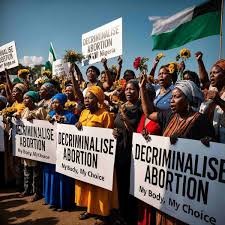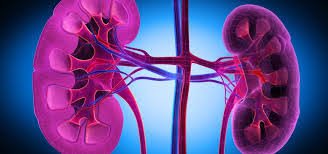There is now therefore no offence for involving in abortion, the Federal government of Nigeria seems to be saying with the planned decriminalization of the act. Abortion law is seemingly abolished with the decision. If proponents argue that high maternal deaths are linked to abortion restriction laws, then, who accounts for uncountable deaths resulting from unsafe abortion? Juliet Jacob articulates the discussions in public space over the reported decriminalizing abortion by Nigerian government
Nigeria Moves to Expand Safe Abortion Access Amidst High Maternal Deaths
Nigeria is taking steps to expand safe abortion access, a crucial move to address the country’s alarming maternal mortality rates. With abortion laws being some of the most restrictive in the world, permitting the procedure only when a woman’s life is at risk, thousands of women are forced to seek unsafe abortions, resulting in devastating consequences.
Nigeria’s Bold Step Towards Safe Abortion
The Nigerian government is taking significant steps towards expanding access to safe abortion services, especially among women and adolescents. This effort is part of a broader initiative aimed at reducing the country’s high maternal mortality rate, with a focus on tackling unsafe abortion practices.

Barrister NMA OGBONNA, head of the Health Promotion Department at the Federal Ministry of Health, made this known during the SRHR Summit 1.0 organized by the Media Health & Rights Initiative of Nigeria (MHR) in Abuja. The event was themed “A Choice for All: Freedom to Plan, Power to Choose.”
Government’s Commitment to Reforming Abortion Laws
During the summit, Barrister Ogbonna announced that the government is reviewing certain sections of the Criminal Code 1090 on abortion. The review involves consultations with relevant ministries, departments, and agencies (MDAs) to ensure that Nigerian women and adolescents have safe healthcare options.
“We are working assiduously to educate the populace on sexual reproductive health and rights, and also addressing maternal deaths in the country,” Ogbonna emphasized, underscoring the government’s dedication to improving reproductive health care.
Nigeria’s Restrictive Abortion Laws, With Exceptions
Abortion laws in Nigeria are quite restrictive, with federal laws governing the practice across the country. The Criminal Code and Penal Code, both established in 1990, prohibit abortion except when it’s necessary to save the woman’s life.
However, some states have enacted their own laws to clarify or restrict abortion further. For instance, Lagos State and Abuja (Federal Capital Territory) allow abortion in cases of rape, incest, or when the woman’s life is at risk.
Despite these exceptions, Nigeria still has one of the most restrictive abortion laws globally, resulting in a staggering number of unsafe abortions. Research suggests that approximately 456,000 unsafe abortions occur annually in Nigeria, contributing significantly to maternal mortality rates.
Penalties for Illegal Abortion
According Chief KOLADE ADISA, a legal practitioner, who spoke to Africa Health Report (AHR), in Nigeria, strict penalties await those involved in illegal abortions.
“Women who undergo self-induced abortions face up to seven years in prison, while healthcare providers performing illegal abortions risk imprisonment for up to 14 years, accompanied by potential fines.”, Adisa explained.
He added that these laws are part of Nigeria’s restrictive abortion regulations, governed by the Criminal Code in southern states and the Penal Code in northern states.
“The only exception to these laws is when the mother’s life is at risk, which calls for the need for reform to ensure safe and accessible reproductive healthcare.”, the lawyer added.
Unfortunately, these stringent laws lead to thousands of unsafe abortions annually, contributing significantly to maternal mortality rates in the country.
15 – 49 Year-Old Woman More Vulnerable
Public health experts are sounding the alarm about Nigeria’s staggering death rate from unsafe abortions, particularly among adolescents.
They’re urging the government to boost investment in sexual and reproductive health services to address this critical issue. The experts emphasize that the lives of women and girls aged 15-49 lost daily to unsafe abortions far outweigh the cost of providing essential facilities and services to prevent these tragedies.
Nigeria’s restrictive abortion laws force thousands of women to seek dangerous, clandestine procedures, resulting in severe health consequences, including nearly 500,000 women experiencing serious complications annually.
Research suggests that young, educated, and urban women are more likely to have abortions, while their younger, uneducated, and rural counterparts are more vulnerable to unsafe procedures.
To combat this, experts recommend increasing awareness about medication abortion drugs and expanding legal conditions for safe abortions. By taking these steps, Nigeria can mitigate the devastating toll of unsafe abortions and ensure women’s reproductive health and well-being.
Calls for Safe Abortion Access
Nigeria’s restrictive abortion laws have sparked renewed calls for expanded safe abortion access, amid alarming maternal mortality rates.
With approximately 456,000 unsafe abortions occurring annually, resulting in 40% of maternal deaths, advocates urge policymakers to reconsider existing regulations.
Currently, abortion is only permitted to save a woman’s life, leaving many vulnerable to unsafe procedures. Experts emphasize that liberalizing abortion laws and increasing access to safe, affordable services would significantly reduce maternal mortality and safeguard women’s reproductive health.
Proposed reforms aim to permit abortion in cases of rape, incest, and fetal impairment, aligning Nigeria with global standards promoting women’s rights and well-being.
Impact of Unsafe Abortions on Maternal Mortality
Dr. ELIJAH OLUSHOLA, Executive Secretary of Ogun State Primary Health Care Department, highlighted the alarming connection between unsafe abortions and maternal deaths.
He pointed out that “over 20% to 30% of maternal deaths in Nigeria result from unsafe abortions, particularly among adolescents and young people.”
This startling statistic illustrates the urgency of reforming abortion laws and expanding access to safe services.
He also lamented the unavailability of routine data on abortion, stressing the need for more comprehensive data collection to inform health policy and interventions.
Rising Maternal Deaths Linked to Unplanned Pregnancies
Another expert voice at the summit, Dr. LUCKY PALMER, Country Director of Ipas Nigeria Health Foundation, further emphasized the devastating effects of unplanned pregnancies on maternal health.
“Unplanned pregnancies contribute to over 1,500 maternal deaths annually in Nigeria,” Dr. Palmer said. He noted that the absence of access to contraception and safe abortion services is a key factor driving these deaths.
WHO Alarming Data
Nigeria faces a staggering maternal mortality crisis, with approximately 67,000 women losing their lives annually due to pregnancy-related complications, translating to at least 20 deaths daily, according to Professor ADESEGUN FATUSI, an expert in Community Medicine and Public Health, citing the World Health Organization’s latest research.
Alarmingly, about 11% of these deaths are attributed to unsafe abortions. This dire situation underscores the need for urgent action to address the country’s restrictive abortion laws and inadequate healthcare services, particularly in rural areas.
The World Health Organization’s data also reveals Nigeria’s maternal mortality rate has remained persistently high, despite global efforts to reduce it, earning the country a grim distinction as one of the top contributors to global maternal deaths.
Hidden Factors Behind Maternal Deaths
Nigeria’s alarming maternal mortality rate is fueled by a combination of medical and social factors, including severe bleeding, malaria, pre-eclampsia, unsafe abortions, ruptured uterus, obstructed labor, anemia, and AIDS.
Poverty, lack of education, and cultural/religious beliefs also significantly contribute to these deaths, as women often lack access to quality healthcare and face stigma seeking reproductive services.
Heart-wrenching personal stories highlight the human toll of restrictive abortion laws, such as that of 25-year-old Aisha in Jabi, Federal Capital Territory (FCT), who died from complications after an unsafe abortion, leaving behind two young children.
Similarly, 30-year-old FATIMA, from Nassarawa State, suffered severe health issues after being denied a life-saving abortion for a pregnancy threatening her life.
Advocates stress the urgent need for policy reforms to address these intersecting factors and ensure safe, accessible reproductive healthcare for Nigerian women.
Advocacy for Increased Access to Contraceptives
The summit also highlighted the importance of contraceptives in reducing maternal mortality. Dr. UFUOMA OMO-OBI, Board Chair of the Media Health & Rights Initiative of Nigeria, used the platform to call for increased availability and access to modern contraceptives. He noted that the World Contraception Day serves as a reminder of the urgent need to ensure reproductive health services are accessible to all, including adolescents and women with disabilities.
“Free and available contraceptives for everyone would help reduce the country’s high maternal mortality rate,” Dr. OMO-OBI asserted. He urged stakeholders to renew their commitment to realizing the sexual and reproductive health rights of all women and girls in Nigeria.
International Context: Nigeria Ranks 6th Globally in Abortion Rates
A United Nations report via the World Population Review reveals that Nigeria has one of the highest abortion rates globally, ranking 6th.
According to the report, Nigeria, alongside Argentina, has an abortion rate of 33 per 1,000 women aged 15-44, a figure surpassed by only five other nations: Vietnam (64), Cuba (55), India (48), Pakistan (43), and Bangladesh (35).
The high abortion rate in Nigeria reflects the challenges faced by women in accessing safe and legal reproductive health services. In contrast, some countries, such as Austria (1.3) and Algeria (0.4), have significantly lower rates, underscoring the disparities in abortion access and related healthcare.
Expert Views and Recommendations
Summing up the discussions at the summit, Dr. Omo-Obi reiterated the critical role that contraceptives and safe abortion services play in reducing maternal deaths.
He called for the support of initiatives that provide comprehensive sexual and reproductive health education, improve access to contraceptives, and ensure safe abortion services are available to those in need.
“We should continue to support initiatives that provide comprehensive sexual and reproductive health education, improve access to contraceptives, and ensure safe abortion services are available for those in need,” he urged.
Steps Towards Ending Maternal Mortality
Experts have urged Nigeria to take a crucial step towards tackling its alarming maternal mortality rate, one of the highest globally, by adopting a multi-faceted approach recommended by experts.
This comprehensive strategy includes relaxing restrictive abortion laws to ensure safe and accessible services, enhancing data collection to better understand the issue and track progress, increasing availability and awareness of contraceptives to prevent unintended pregnancies, and expanding access to safe and clinical abortion services to reduce unsafe procedures.
The current situation is dire, with approximately 67,000 women losing their lives annually due to pregnancy-related complications, and about 11% of these deaths attributed to unsafe abortions. By implementing these measures, Nigeria can significantly reduce maternal mortality and enhance women’s reproductive health.
According to experts, with these measures, Nigeria can significantly reduce maternal mortality and enhance women’s reproductive health. The government’s efforts are a crucial step towards addressing this critical issue and ensuring that women have access to the care they need to stay safe and healthy.




Blue Techker Pretty! This has been a really wonderful post. Many thanks for providing these details.